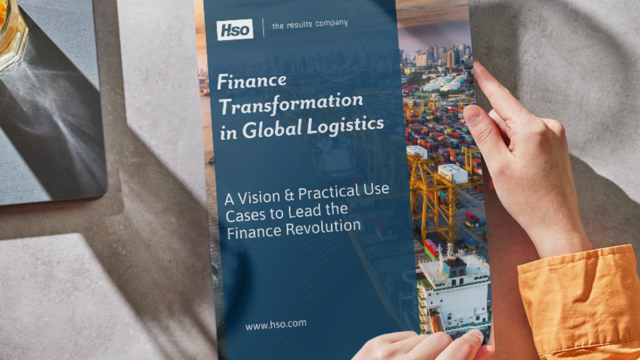75% of logistics CFOs still spend 6+ hours a week rebuilding reports, but here’s why that’s changing.
Modern Finance Trends in Global Logistics
How Top Logistics CFOs Are Gaining Strategic Influence with Dynamics 365 Finance and Operations

CFOs are trading back‑office spreadsheets for a seat at the strategy table, where they’re shaping the future of business strategy with every decision.
Global logistic service providers (LSP’s) that empower them to fill these shoes will position themselves to lead, despite increasing financial volatility, regulatory complexity, and geopolitical uncertainty.
Let’s dive into the Modern Finance trends shaping the future of logistic service providers (LSPs), why they matter to global firms, and how you can help your team stay ahead of the game.

How Is the Role of the Finance Departments Changing in Logistic Service Providers (LSPs)?
Everyone knows not to walk into the finance department during monthly or year‑end closing. It’s a pressure cooker of spreadsheets and reports that pushes strategic needs to the bottom of the priority list.
But the future isn’t just about balancing books anymore.
Today, global finance departments are working closely with other business functions to drive decisions—from proactively responding to financial volatility to navigating the regulatory complexity triggered by international mergers and acquisitions.
CFOs of logistic service providers are now expected to have one hand on the purse strings and the other on the company’s strategy playbook.
Data, metrics, and analytics emerged as the top CFO priority for 2025.
So, what’s fueling this shift in global logistics firms?
A series of industry trends are driving this change.

- 1
More Data, Less Time
The explosion of data means finance teams have to analyze volumes of complex information faster than ever before.
And yet, a 2024 report by Insightsoftware revealed that 75% of finance teams spend six hours a week recreating reports, adding up to a whopping 300 hours per year lost to inefficiency.
- 2
Increased Global Complexity and Risk
For multinational logistics firms, the advantages of global operations come with increased compliance and regulatory risks, carried by the finance office. The cost of non-compliance is significant.
Worldwide fines due to non-compliance reached $14 billion USD in 2024, with finance teams often suffering the fiscal and reputational impact. (Thomson Reuters Regulatory Intelligence, 2024).
- 3
The C-Suite Seat
It’s time to shine in finance. According to analysis by Harvard Business Review, nearly 90% of executives agree that “Finance teams can provide a unique and valuable perspective on business challenges.”
- 4
Digitalization & FreightTech Transformation
The trend of increasing automation in warehousing, transport tracking, customer portals, and more (known as “FreightTech”) puts presssure on finance teams operating on outdated systems.
Smart warehousing alone is projected to be a $57.97 billion USD industry by 2030 (The Research Insights). As other areas of logistics become modernized and automated, the finance department must evolve to lead strategically at a faster pace.
Why Should I Care About These Trends?

Logistic service providers know that global operations are more financially volatile than ever.
Variable expenses such as fuel surcharges, tariffs, duties, and currency exchange rates are increasingly unpredictable and create cash flow uncertainty.
Combined with the traditionally thin margins of the logistics industry, finance leaders must respond with flexibility and forward-looking insights.
But pivoting can be expensive, and finance departments have the fiscal insight to enable risk‑conscious investment decisions.

Europe, in particular, is at a crossroads.
Analysts warn that underinvestment in technology and innovation has left the region lagging behind other global players.
Logstics CFOs, when armed with financial analysis tools, can respond to financial volatility proactively and inform better decision-making.
But if your finance department is busy sifting through data and buried in financial reports, none of this is possible.
That’s why investing in a modern finance platform isn’t just a “nice‑to‑have” anymore—it’s a survival tactic for LSP’s in today’s unpredictable landscape.

How Can I Empower My Finance Teams?
If you want your finance team to provide more than ledgers, equip them with the right tools.
Unified Data
Fragmented data is the nemesis of good decision making. A unified ERP platform gives you a 360 degree view of your financial operations.
Composable Design
Build a modular system that grows with your needs. Why buy an all in one solution when you can piece together the best tools for your business?
Scalability and Flexibility
Future proof your finance function with cloud based solutions that can adapt to whatever comes your way.
The Holy Grail: A Modern ERP with Scalable Accelerators
If there’s one tool that embodies everything that global modern finance stands for, it’s Microsoft Dynamics 365 Finance and Operations. This ERP system does more than just streamline processes; it empowers finance teams to make data‑driven decisions in real time.

Here’s why it’s a game-changer:
- Streamlined processes: Say goodbye to manual reconciliations. Dynamics 365 Finance and Operations and Copilot for Finance automate repetitive tasks, saving time and reducing errors.
- Strategic Insights: A birds-eye view. Paired with HSO’s DNA Accelerator, finance teams gain access to one-look dashboards and analytics tailored to their unique needs.
- Autonomous Finance: Pivot in the blink of an eye. Tools like Aptitude Fynapse provide real-time visibility into financial performance and predictive outcomes, so you can make faster data-driven decisions.

Features are great, but we know ROI is king.
100x
Reduction in manual data entries
≤ 50%
Reduction in costs related to closings
70%
Reduction in the number of accounting rules
3x
Faster than on‑premise solutions
Data is the CFO's compass, but with global information exploding, navigating it can be daunting. Finance leaders and their teams can act as data stewards, using advanced analytics, AI and cloud technology to improve forecasting, cash management, organizational transformation and to inform acquisition or IPO decisions.

Access Our Whitepaper With 3 Transformation Frameworks and 6 ROI Benchmarks
Discover four transformative use cases, from P&L reports to autonomous agents, that demonstrate how modern finance helps global logistics firms navigate complexity, volatility, and growth.

Contact Us For a Personalized Roadmap to Navigating the Newest Trends
Read more
Discover More About Modern Finance in Global Logistics Service Providers
Discover More About Modern Finance in Global Logistics Service Providers











